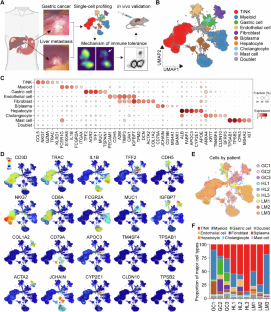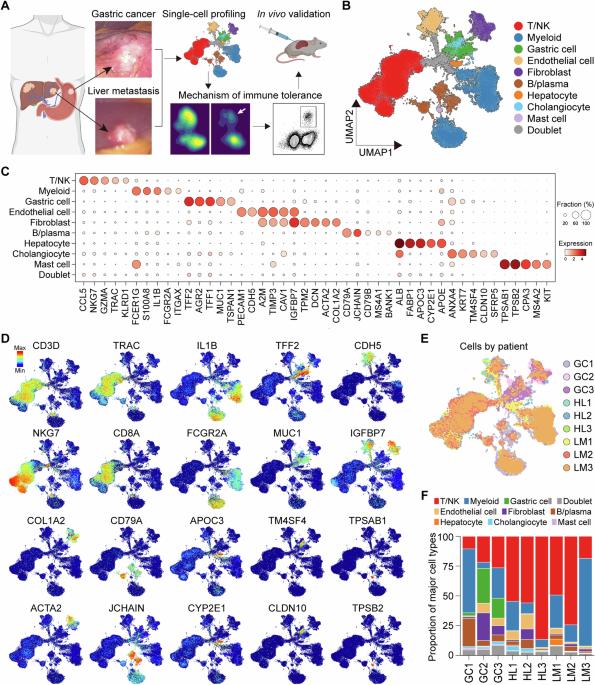Single-cell profiling reveals altered immune landscape and impaired NK cell function in gastric cancer liver metastasis
IF 6.9
1区 医学
Q1 BIOCHEMISTRY & MOLECULAR BIOLOGY
引用次数: 0
Abstract
Gastric cancer (GC) is a substantial global health concern, and the development of liver metastasis (LM) in GC represents a critical stage linked to unfavorable patient prognoses. In this study, we employed single-cell RNA sequencing (scRNA-seq) to investigate the immune landscape of GC liver metastasis, revealing several immuno-suppressive components within the tumor immune microenvironment (TIM). Our findings unveiled an increased presence of cancer-associated fibroblasts (CAFs), myeloid-derived suppressor cell (MDSC)-like macrophages, tumor-associated macrophage (TAM)-like macrophages, and naive T cells, while conventional dendritic cells (cDCs) and effector CD8 T cells declined in LM. Additionally, we identified two distinct natural killer (NK) cell clusters exhibiting differential cytotoxicity-related gene expression, with cytotoxic NK cells notably reduced in LM. Strikingly, TGFβ was identified as an inducer of NK cell dysfunction, potentially contributing to immune evasion and tumor metastasis. In preclinical LM models, the combined approach of inhibiting TGFβ and transferring NK cells exhibited a synergistic impact, resulting in a significant reduction in liver metastasis. This work highlights the importance of understanding the complex immune dynamics within GC liver metastasis and presents a promising strategy combining TGFβ inhibition and NK-based immunotherapy to improve patient outcomes.


单细胞图谱分析揭示了胃癌肝转移中免疫格局的改变和 NK 细胞功能的受损。
胃癌(GC)是全球关注的重大健康问题,而胃癌肝转移(LM)的发展是与患者预后不良有关的关键阶段。在这项研究中,我们利用单细胞RNA测序(scRNA-seq)研究了胃癌肝转移的免疫格局,揭示了肿瘤免疫微环境(TIM)中的几种免疫抑制成分。我们的发现揭示了肿瘤相关成纤维细胞(CAFs)、髓源抑制细胞(MDSC)样巨噬细胞、肿瘤相关巨噬细胞(TAM)样巨噬细胞和幼稚T细胞的增加,而传统树突状细胞(cDCs)和效应CD8 T细胞在LM中减少。此外,我们还发现了两个不同的自然杀伤(NK)细胞群,它们表现出不同的细胞毒性相关基因表达,其中细胞毒性NK细胞在LM中明显减少。令人震惊的是,TGFβ被认为是NK细胞功能障碍的诱导因子,可能会导致免疫逃避和肿瘤转移。在临床前LM模型中,抑制TGFβ和转移NK细胞的联合方法表现出协同作用,显著减少了肝转移。这项研究强调了了解 GC 肝转移瘤内复杂免疫动态的重要性,并提出了一种将抑制 TGFβ 和基于 NK 的免疫疗法相结合以改善患者预后的可行策略。
本文章由计算机程序翻译,如有差异,请以英文原文为准。
求助全文
约1分钟内获得全文
求助全文
来源期刊

Oncogene
医学-生化与分子生物学
CiteScore
15.30
自引率
1.20%
发文量
404
审稿时长
1 months
期刊介绍:
Oncogene is dedicated to advancing our understanding of cancer processes through the publication of exceptional research. The journal seeks to disseminate work that challenges conventional theories and contributes to establishing new paradigms in the etio-pathogenesis, diagnosis, treatment, or prevention of cancers. Emphasis is placed on research shedding light on processes driving metastatic spread and providing crucial insights into cancer biology beyond existing knowledge.
Areas covered include the cellular and molecular biology of cancer, resistance to cancer therapies, and the development of improved approaches to enhance survival. Oncogene spans the spectrum of cancer biology, from fundamental and theoretical work to translational, applied, and clinical research, including early and late Phase clinical trials, particularly those with biologic and translational endpoints.
 求助内容:
求助内容: 应助结果提醒方式:
应助结果提醒方式:


